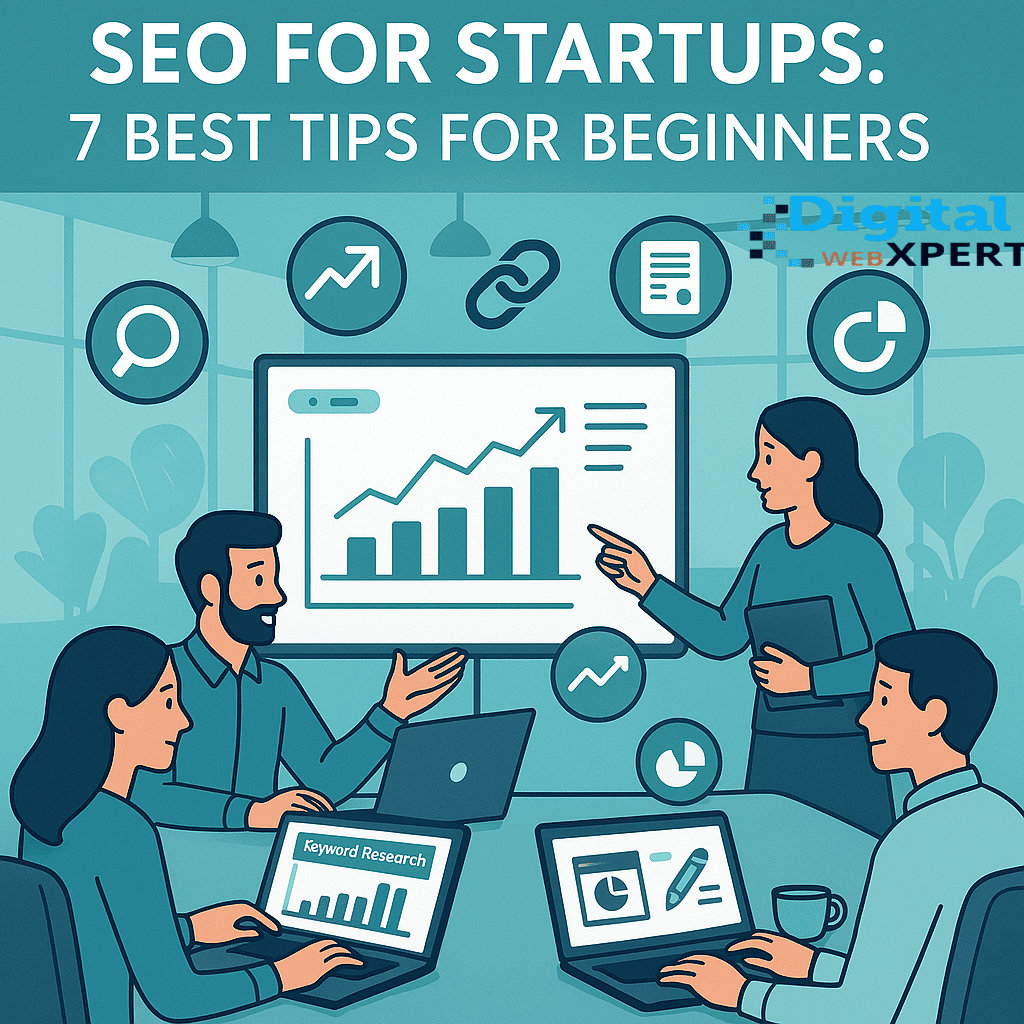Starting a new business is exciting—but getting noticed online can feel overwhelming. That’s where SEO for startups becomes your secret weapon. Search Engine Optimization (SEO) helps your startup website appear in search engines like Google, bringing organic (free!) traffic to your brand.
In this comprehensive beginner-friendly guide, we’ll explore 7 essential SEO tips that every startup can implement without needing a huge budget or technical background. Whether you’re building a SaaS tool, launching an eCommerce store, or starting a service-based business, this is the SEO roadmap to kickstart your growth.
🌱 Why SEO for Startups Matters
Unlike paid advertising, SEO builds long-term visibility and trust. It helps your startup get discovered by people actively searching for what you offer.
Here’s what good SEO brings to your startup:
- 🔍 Increased organic traffic
- 🏆 Higher credibility and trust
- 💰 Cost-effective marketing over time
- 🎯 Qualified leads from targeted keywords
- 📈 Sustainable online growth
The earlier you invest in SEO for startups, the faster you’ll scale with predictable results.
✅ Tip 1: Start with Keyword Research
Before creating content, understand what your audience is searching for. Use tools like:
- Google Keyword Planner
- Ubersuggest
- SEMrush
- Ahrefs
- AnswerThePublic
Find keywords with high search volume and low competition that are relevant to your product or service. For example, if you offer virtual HR services, your keywords might include:
- “HR software for startups”
- “virtual HR platform”
- “how to manage remote teams”
Pro Tip: Focus on long-tail keywords (e.g., “affordable marketing tools for startups”) to attract more qualified visitors.
✅ Tip 2: Optimize Your Website Structure
Your website must be easy for both users and search engines to navigate. Key elements to optimize:
- 🔗 Simple and logical URL structure (e.g.,
/seo-for-startups) - 📄 SEO-optimized title tags and meta descriptions
- 🧭 Internal linking between related pages
- 📱 Mobile-friendly, responsive design
- 🚀 Fast loading speed (under 3 seconds)
Use tools like Google PageSpeed Insights and GTMetrix to analyze and improve performance.
✅ Tip 3: Create Quality, Keyword-Optimized Content
Content is the heart of SEO for startups. You need to consistently publish valuable blog posts, landing pages, and product pages that solve your audience’s problems.
What makes content “SEO-friendly”?
- 📌 Target keyword in title, intro, and subheadings
- 🧠 Clear, informative, and original writing
- 🖼️ Use of images with proper alt text
- 🔗 Internal and external links
- ✍️ Easy to read with short paragraphs and bullet points
Example blog ideas:
- “Best CRM Tools for SaaS Startups”
- “How to Build a Remote Tech Team from Scratch”
- “Top 10 Productivity Apps for Founders”
✅ Tip 4: Build High-Quality Backlinks
Backlinks (links from other websites to yours) signal to Google that your content is trustworthy. But avoid spammy link schemes—focus on organic backlink building.
How to build backlinks:
- 📝 Guest blogging on niche sites
- 📢 Submitting to startup directories and PR sites
- 🤝 Partnering with influencers or other startups
- 📊 Sharing original data, infographics, or research
Tools like Ahrefs, BuzzSumo, and HARO (Help A Reporter Out) can help you find link opportunities.
✅ Tip 5: Leverage Local SEO (If Applicable)
If your startup targets a specific region (e.g., app development in Bangalore), local SEO is a must.
Steps to follow:
- 📍 Create and optimize a Google Business Profile
- 🧾 Include NAP info (Name, Address, Phone) consistently
- 🌍 Add location-based keywords (e.g., “web design startup in Kolkata”)
- ✍️ Get local citations and directory listings
This boosts your chances of appearing in the Google Local Pack when users search nearby.
✅ Tip 6: Measure SEO Performance with Analytics
What you don’t measure, you can’t improve. Track key SEO metrics such as:
- 📊 Organic traffic
- 🔑 Keyword rankings
- ⏱️ Bounce rate & time on site
- 📈 Conversion rate
- 🧭 Top-performing pages
Use:
- Google Analytics
- Google Search Console
- Ubersuggest or Ahrefs
Monitor your performance and refine your strategy monthly.
✅ Tip 7: Be Patient and Stay Consistent
Here’s the truth—SEO takes time. You won’t rank on Page 1 overnight. But with consistent effort, results will build over time and continue working for your business long after you stop investing directly.
Even if you’re doing a startup SEO plan in-house, try to publish 1-2 blog posts per week, build backlinks monthly, and audit your website quarterly.
✨ Bonus: Tools to Help with SEO for Startups
Here are some beginner-friendly tools to manage SEO efficiently:
- Yoast SEO (WordPress plugin)
- RankMath (advanced WordPress SEO)
- Ubersuggest (affordable keyword and audit tool)
- Canva (for creating optimized images with alt text)
- Surfer SEO (for on-page optimization and content scoring)
🔚 Final Thoughts
SEO for startups isn’t a luxury—it’s a necessity. If you want your business to be discoverable online, attract organic leads, and compete with bigger players, you need to invest in the right strategies from Day One.
With these 7 beginner SEO tips, you can lay a strong foundation for long-term visibility, traffic, and brand growth. And remember—whether you handle SEO in-house or hire an expert, what matters is staying consistent and focused on value.
So go ahead—optimize your website, start publishing smart content, and let Google do the heavy lifting!



